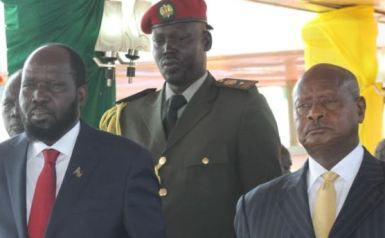S. Sudan president in Uganda after peace talks with rebels hit deadlock
October 8, 2014 (JUBA) – South Sudanese president Salva Kiir Mayardit has travelled to neighbouring Uganda to attend a regional summit on the northern corridor integration project.

The president left the capital, Juba, on Tueday, just hours after after being briefed by members of his government delegation on the progress of peace talks, which are being mediated bythe Intergovernmental Authority on Development (IGAD) in Ethiopia.
He was seen off at Juba International Airport by his deputy, James Wani Igga, as well as several cabinet ministers and high-ranking security officers and government-affiliated business people.
CONNECTING EAST AFRICA
Speaking to the press prior to Kiir’s arrival in Uganda, Awan Guol Wol Riak, minister in the office of the president, said that regional leaders attending the summit would work towards developing a strategic plan to launch the construction of the Standard Gauge Railway project, which will connect the different countries within the region.
Other projects would include the construction of an oil pipeline and refinery, port development and electricity generation.
The convening of the summit coincides with Uganda’s independence celebrations on Thursday and officials at the ministry of foreign affairs and the presidency told Sudan tribune that Kiir is among the heads of state invited to attend.
In a statement broadcast by state-owned South Sudan Television (SSTV) on Tuesday, information minister Michael Makuei Lueth said the president’s briefing was important as it would help him engage with regional leaders during his visit.
TALKS STALL
Lueth, who was speaking on behalf of the government delegation at IGAD-led peace talks, said negotiations had been adjourned after hitting a deadlock over the function of the proposed position of the prime minister and the president.
“The rebels want an executive prime minister, which is not in conformity with the provision of the protocol,” he said, referring to the set of agreed principles brokered by IGAD which are to form the basis for negotiations.
Under the guiding principles, the current president would serve as the head of state and government, a move opposed by rebel forces led by former vice-president Riek Machar who have been engaged in an armed struggle with the government since mid-December last year.
“This where we did not make any progress, so the mediators decided to adjourn the talks so that they go for consultations with IGAD heads of states and government,” said Lueth.
Many government officials and analysts say the president is expected to use the summit to lobby IGAD heads of state and government not back down on the proposal or grant more powers to the prime minister a power in the interim government.
“The whole thing has been complicated by the IGAD protocol and it is [up to] the IGAD heads of state to resolve it if they want the conflict to be resolved through peaceful dialogue,” an observer told Sudan tribune on Wednesday.
“The protocol wants the position of the prime minister to be like that of Uganda, which does have any power,” he added.
PRAY FOR PEACE
Luka Biong Deng, former Sudanese cabinet minister and now associate professor at Juba University in the department of development economics, has called on religious leaders to pray for peace in the hopes that the country’s rival leaders would be able to resolve their differences over executive powers amicably.
“These are fundamental matters and they need to be approached with wisdom,” he said.
“On one hand the president was as an elected president and the people wanted him to be the head of the government and state so that he runs the country with necessary powers to implement the programs for which he sought their mandate. On the other hand it is also necessary for the prime minister to have powers in order to be able to run the day-to-day activities of the government. If these issues are resolved, I think it is possible peace will come to the country,” Deng added.
(ST)
